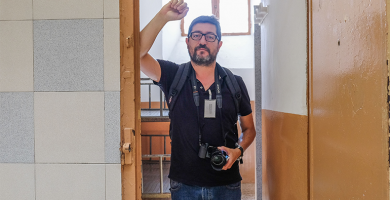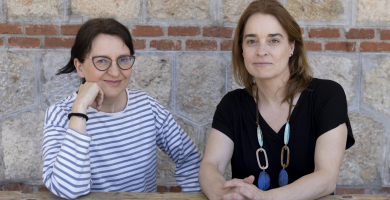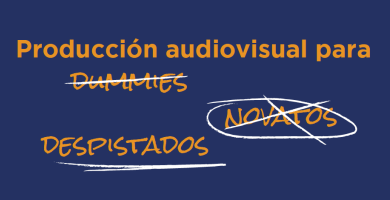
Jaume Jordana: "Locating is a bit to open up and pave the way for those who come behind"
We interview location scouter Jaume Jordana. As a professional photographer, he went into the world of film and advertising production, where he learned everything he needed to start this work.

He became head of production and location manager. Now with his company, visionparticular, he has specialized himself in scouting, the search of locations for film, television series and advertising. We talked to him about his professional work.
- What does a location scouter do in his job?
A location scouter looks for spaces or natural scenery, other than sets. Spaces where to shoot the different sequences in a script or a commercial. It’s necessary to consider a series of criteria, not to look for any place. The spaces must adapt physically to what is requested, with permits, needs, remoteness or proximity of the production centre. In this case, it’s Barcelona, but it could be Madrid, Girona or any other place. We work very close to the art director and with production. More in fiction because in advertising it’s more independent.
- Tell us about a day in the life of Jaume Jordana as a location scouter.
The days are different one from each other. You usually have one main job and two or three secondary jobs. I start at the office in the Canòdrom Meridiana, a municipal coworking. I order the mails and the research that I have to do or if I have to go to the production company to present locations or for a meeting. Then, the day is set up with different appointments, some of them to go to locate interior spaces or in a more generic location, street or road, which is more of an adventure.
Unfortunately for us, our work is becoming more and more office work. To order photos or send options to different clients. You work more with your archive and it has to be renewed. Sometimes I do more of location coordinator than location scouter per se. The days start early and end late. I try to keep an order, I work from Monday to Friday and, if there are no night locations, even if you start early, I’ll try to finish at 21. You need to have a certain order. It also helps a lot not to go to shootings. Although I think you can’t locate if you didn’t have a very hard shooting experience before. Now there are many people who start to locate and have not gone through production, I do not recommend it. This work experience is very important.
- Why do you think it's so important?
You should always remember when you are photographing a space that a film crew will come after you, larger or smaller, and the space will be transformed as needed. You are not seeing a place for its beauty or its ugliness. You have to think that behind you will come a huge camp, full of trucks, people, transformations and artistic equipment, production and management. It is very important to have experienced this on the front line. You have to know how the trucks are parked or what permits are required to shoot. If you have not spent enough years doing this, it’s impossible to locate and know exactly what you are doing.
- What difficulties has a location scouter in his work?
Many, especially for people who are asking for permits. Although I did not ask for them I should keep it in mind. You have to know, in each city, what limitations there are, which in Barcelona lately are quite hard. Then, you have to think also in the limitations of time, spaces or difficulties of accessing the place to roll. You have to know how to manage well how to get there. It isn’t only to enter to a new space just to enter, but because there is after the possibility of filming. You have to have knowledge, know where to go, have resources and especially an agenda. Locating is not an easy job. Over the years you gain experience, but you have to prove it. You always begin again in each production. The previous work you have done doesn’t count anymore.
- What are the most rewarding things about this job?
If you open a new location or insist a lot on a particular space, you get to show it in public and there is a great filming that uses it. Obviously, the production is collective, but you have pave the way, to open new spaces. And the gratification of being able to make a good product. It’s really the most important thing. If you don’t make a good product, although each small department take the credit, is not a good product.
- Are there many differences between finding a location for a movie or a television series?
Yes, they basically come from the needs of each one. For example, a television series is a long-term location that will be used for many episodes, not to mention a soap opera such as TV3's that it's seven years old. It is a location that you must keep in mind that you go in and out many times. In filming movies is more intense and has a more punctual use. If we talk about fiction, both in cinema and television, the use of the location is 360 degrees. You see it all and it's important that it works by itself. In advertising, a single frame is more important and should be perfect. However, it doesn't matter so much everything around.
- Are there many differences between finding indoor and outdoor locations? On the outside, it also depends on the weather or other factors that you don't find inside, right?
When you locate outdoors, forests or nature, you must keep in mind what time of the year you took the photos. The archive is less important, it has to be renewed often because nature, in addition in a Mediterranean climate as ours, every three months the landscape changes. You have to see if the water level goes up or down, if the trees are with leaves or without, how are the roads, even the sky or the hours of light. The interiors are more stable.
- Is it very difficult to convince someone to let you shoot in a space?
There are some spaces that have a fix price, such as theatres, sports centres or a house that already has regular shooting experience. In other locations, you have to give a lot of explanations and then, they always told you they never imagined it was so big. Sometimes, as you are the first to reach the places, you have to play a little with people’s expectations and illusions, without deceiving. It's a bit to open up and pave the way for those who come behind. However, it is complicated because most of the time they think that it is just a tripod, a camera and two actors and they do not imagine everything that comes behind.
- Do you work mostly in Barcelona and Catalonia or abroad too?
When I started I moved all over the peninsula even in Europe. We did not have the technological means we have today. They wanted it the artisan way. The director trusted you so you went to France, Italy or Andalusia to locate. Now, it matters who make the locations, but more and more the immediacy and if it's cheaper, of course. So, you end up specializing in a specific territory. Most of the time is Barcelona and its surroundings. There is also an unwritten law, especially in the cinema that more than 45 min of travel create expenses that many times cannot be assumed. If you need a location in Madrid, Bilbao or Paris, you call a collaborator there and maybe you only go for a day. Each time we specialize more in our own territory.
- As you have worked with international productions, do they want to shoot in Barcelona and they maybe think that other places like Montserrat or Figueres are also Barcelona?
Normally, when international productions from New York, Tokyo or London come here, they come to Barcelona. They do not come to Catalonia. Although it's an added value we have to push ahead. It hurts that they come to shoot a fiction or an advertising campaign in Barcelona and you have to tell them that they must shoot outside the metropolitan area because the permit it's easier. This is very complicated to manage because they want what they have imagined. What sells is Barcelona. Obviously, as a big capital, what I defend and tell them, is that it has higher prices and more restricted shooting conditions. All this has to be explained. It's not done many times. When we go to shoot in Amsterdam or in Paris, we already know that it's expensive and difficult. And we made an effort to go. However, this image of Barcelona is often sold as a European city brand, where you can shoot as if it was any city. They tell them that it's allowed to roll very easily and they find here that it's not so. This is what some producers sell here. You have to be able to mediate, that's what you are for also, to take some mediation between the different parts.
It's very positive that Catalonia has a lot of scenery. Catalonia is seen as the Hinterland of Barcelona, because around the city you have sea and mountain. All this, gives us force to bring productions here to shoot, but you cannot say yes and then say, you cannot shoot in the Poble Nou and you have to go to a provincial or county capital 35 km away. Surely it has very good locations, but it is not what they are looking for. So, you have to make an effort and it's hard to sell them that, when you pay to shoot in Barcelona.
- What do you think the Barcelona Film Commission is fundamental in helping you do your job?
Because of what I told you before. I also work a lot with the Catalunya Film Commission. The Barcelona Film Commission is essential to mediate between public administrations and private or not so private productions, they can also be TV3 or TVE. Mediate with locations, permits and spaces. And knowing to be between the two parts and that the shock is not so frontal. Apart from the more institutional support. This mediation function is basic because if it were producers against administration, we would never shoot. Producers want to do everything and the administrations ...well, it's complicated because Barcelona is a very dense and touristy city. Suddenly, cutting two streets on weekdays for a shooting is very complicated and you have to know how to mediate very well for all parties. It is a subject in which the BFC has much to say.
- What are you currently working on?
I'm working now on several productions. One of them, which I spend most of my hours this summer, is a series for Movistar television, which is producing quite a few series now, some in Barcelona. It's a novel by Ignacio Martínez de Pisón about the Barcelona of the sixties and seventies directed by Mariano Barroso. A very interesting and creative project. I also collaborate with other series of Movistar like Carta al Padre directed by Mar Coll. In films, I am working with Rodar and Rodar, in a story about the photographer of Mauthausen, directed by Mar Targarona. It's a very interesting project that is being shot in Hungary and Catalonia, not in Barcelona, because the Austrian and German concentration camps of the 1940s have to be reproduced. I also do series for TV3, Filmax and as always with several ads that give a lot of energy to the production here.










